| Listing 1 - 10 of 17 | << page >> |
Sort by
|
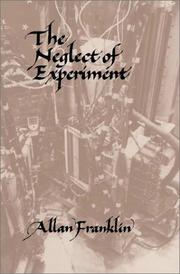
ISBN: 052132016X 0521379652 0511624891 9780521320160 9780511624896 9780521379656 Year: 1986 Publisher: Cambridge Cambridge University Press
Abstract | Keywords | Export | Availability | Bookmark
 Loading...
Loading...Choose an application
- Reference Manager
- EndNote
- RefWorks (Direct export to RefWorks)
What role have experiments played, and should they play, in physics? How does one come to believe rationally in experimental results? The Neglect of Experiment attempts to provide answers to both of these questions. Professor Franklin's approach combines the detailed study of four episodes in the history of twentieth century physics with an examination of some of the philosophical issues involved. The episodes are the discovery of parity nonconservation ( or the violation of mirror symmetry) in the 1950s; the nondiscovery of parity nonconservation in the 1930s, when the results of experiments indicated, at least in retrospect, the symmetry violation, but the significance of those results was not realized; the discovery and acceptance of CP ( combined parity-charge conjugations, paricle-antiparticle) symmetry; and Millikan's oil-drop experiment. Franklin examines the various roles that experiment plays, including its role in deciding between competing theories, confirming theories, and calling fo new theories. The author argues that one can provide a philosophical justification for these roles. He contends that if experiment plays such important roles, then one must have good reason to believe in experimental results. He then deals with deveral problems concerning such reslults, including the epistemology of experiment, how one comes to believe rationally in experimental results, the question of the influence of theoretical presuppositions on results, and the problem of scientific fruad. This original and important contribution to the study of the philosophy of experimental science is an outgrowth of many years of research. Franklin brings to this work more than a decade of experience as an experimental high-energy physicist, along with his significant contributions to the history and philosophy of science.
Philosophy of science --- Science --- Physics --- Experiments --- Philosophy --- -Science --- -Natural science --- Science of science --- Sciences --- Natural philosophy --- Philosophy, Natural --- Physical sciences --- Dynamics --- -Philosophy --- Normal science --- Natural science --- Experiments&delete& --- Natural sciences --- Arts and Humanities --- Science - Experiments - Philosophy --- Science - Philosophy --- Physics - Philosophy --- Philosophy. --- #GBIB:CBMER
Book
ISBN: 1563961199 Year: 1993 Publisher: New York (N.Y.): American institute of physics
Abstract | Keywords | Export | Availability | Bookmark
 Loading...
Loading...Choose an application
- Reference Manager
- EndNote
- RefWorks (Direct export to RefWorks)
Algemene zwaartekracht --- Assumption (Hypothesis) --- Gravitatie --- Gravitation --- Hypotese --- Hypothese --- Hypothesis --- Hypothèse --- Supposition --- Physics --- -Physics --- -Science --- -Natural science --- Science of science --- Sciences --- Natural philosophy --- Philosophy, Natural --- Physical sciences --- Dynamics --- Assumption --- Logic --- Reasoning --- Science --- Field theory (Physics) --- Matter --- Antigravity --- Centrifugal force --- Relativity (Physics) --- Methodology --- Philosophy --- Properties --- -Methodology --- Normal science --- Philosophy of science
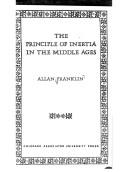
ISBN: 0870810693 9780870810695 Year: 1976 Publisher: Boulder Colorado university press
Abstract | Keywords | Export | Availability | Bookmark
 Loading...
Loading...Choose an application
- Reference Manager
- EndNote
- RefWorks (Direct export to RefWorks)
Mechanics --- Inertia (Mechanics) --- Science, Medieval --- History --- -Inertia (Mechanics) --- -Science, Medieval --- 53 <09> --- Medieval science --- Acceleration (Mechanics) --- Mass (Physics) --- Classical mechanics --- Newtonian mechanics --- Physics --- Dynamics --- Quantum theory --- Physics--Geschiedenis van ... --- 53 <09> Physics--Geschiedenis van ... --- Physics--Geschiedenis van .. --- Mechanics - History --- Inertia (Mechanics) - History
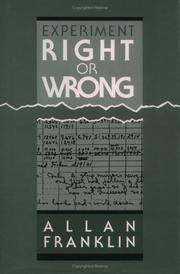
ISBN: 0521382076 0521064775 0511527306 9780521382076 9780511527302 9780521064774 Year: 2003 Publisher: Cambridge Cambridge University Press
Abstract | Keywords | Export | Availability | Bookmark
 Loading...
Loading...Choose an application
- Reference Manager
- EndNote
- RefWorks (Direct export to RefWorks)
In Experiment, Right or Wrong, Allan Franklin continues his investigation of the history and philosophy of experiment presented in his previous book, The Neglect of Experiment. Using a combination of case studies and philosophical readings of those studies, Franklin again addresses two important questions: (1) What role does and should experiment play in the choice between competing theories and in the confirmation or refutation of theories and hypotheses? (2) How do we come to believe reasonably in experimental results? Experiment, Right or Wrong makes a significant contribution to an important area in contemporary history and philosophy of science. Philosophers and historians of science, physicists, and advanced students in these areas will find much of interest in this engaging study.
Science --- Nuclear physics --- Philosophy. --- History. --- Experiments. --- -Science --- -Natural science --- Science of science --- Sciences --- Atomic nuclei --- Atoms, Nuclei of --- Nucleus of the atom --- Physics --- Experiments --- History --- Philosophy --- -Experiments --- Normal science --- Philosophy of science --- Arts and Humanities --- Science - Philosophy. --- Science - History. --- Nuclear physics - Experiments.
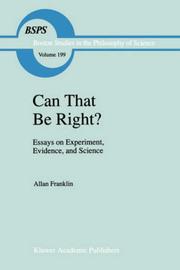
ISBN: 0792354648 9401062420 9401153345 Year: 1999 Volume: 199 Publisher: Dordrecht Kluwer
Abstract | Keywords | Export | Availability | Bookmark
 Loading...
Loading...Choose an application
- Reference Manager
- EndNote
- RefWorks (Direct export to RefWorks)
In this collection of essays Allan Franklin defends the view that science provides us with knowledge about the world which is based on experimental evidence and on reasoned and critical discussion. In short, he argues that science is a reasonable enterprise. He begins with detailed studies of four episodes from the history of modern physics: (1) the early attempts to detect gravity waves, (2) how the physics community decided that a proposed new elementary particle, 17-keV neutrino, did not exist, (3) a sequence of experiments on K meson decay, and (4) the origins of the Fifth Force hypothesis, a proposed modification of Newton's Law of Universal Gravitation. The case studies are then used to examine issues such as how discord between experimental results is resolved, calibration of an experimental apparatus and its legitimate use in validating an experimental result, and how experimental results provide reasonable grounds for belief in both the truth of physical theories and in the existence of the entities involved in those theories. This book is a challenge to the critics of science, both postmodern and constructivist, to provide convincing alternative explanations of the episodes and issues discussed. It should be of interest to philosophers, historians, and sociologists of science, and to scientists themselves.
-Experiments --- Science --- Experiments --- Philosophy --- Case studies. --- Philosophy. --- Case studies --- Normal science --- Philosophy of science --- Natural science --- Science of science --- Sciences --- Experiments&delete& --- Philosophy&delete& --- Natural sciences --- Philosophy and science. --- Physics. --- History. --- Philosophy of Science. --- History and Philosophical Foundations of Physics. --- History, general. --- Annals --- Auxiliary sciences of history --- Natural philosophy --- Philosophy, Natural --- Physical sciences --- Dynamics --- Science and philosophy
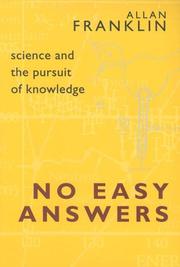
ISBN: 9780822959687 082294250X 0822959682 9780822942504 Year: 2007 Publisher: Pittsburgh, Pa University of Pittsburgh Press
Abstract | Keywords | Export | Availability | Bookmark
 Loading...
Loading...Choose an application
- Reference Manager
- EndNote
- RefWorks (Direct export to RefWorks)
In No Easy Answers, Allan Franklin offers an accurate picture of science to both a general reader and to scholars in the humanities and social sciences who may not have any background in physics. Through the examination of nontechnical case studies, he illustrates the various roles that experiment plays in science. He uses examples of unquestioned success, such as the discoveries of the electron and of three types of neutrino, as well as studies that were dead ends, wrong turns, or just plain mistakes, such as the "fifth force," a proposed modification of Newton's law of gravity. Franklin argues that science is a reasonable enterprise that provides us with knowledge of the natural world based on valid experimental evidence and reasoned and critical discussion, and he makes clear that it behooves all of us to understand how it works.
Philosophy of science --- Science --- Methodology --- Science - Popular works --- Science - Methodology - Popular works
Book
ISBN: 0822981009 9780822981008 9780822944416 0822944413 Year: 2016 Publisher: Pittsburgh, Pa. University of Pittsburgh Press
Abstract | Keywords | Export | Availability | Bookmark
 Loading...
Loading...Choose an application
- Reference Manager
- EndNote
- RefWorks (Direct export to RefWorks)
What makes a good experiment? Although experimental evidence plays an essential role in science, as Franklin argues, there is no algorithm or simple set of criteria for ranking or evaluating good experiments, and therefore no definitive answer to the question. Experiments can, in fact, be good in any number of ways: conceptually good, methodologically good, technically good, and pedagogically important. And perfection is not a requirement: even experiments with incorrect results can be good, though they must, he argues, be methodologically good, providing good reasons for belief in their results. What Makes a Good Experiment? revisits the important question Franklin posed in his 1981 article of the same title in BJPS, when it was generally believed that the only significant role of experiment in science was to test theories. But experiments can actually play a lot of different roles in science, as he explains--they can, for example, investigate a subject for which a theory does not exist, help to articulate an existing theory, call for a new theory, or correct incorrect or misinterpreted results. This book provides details of good experiments, with examples from physics and biology, illustrating the various ways they can be good and the different roles they can play.
Experimental design. --- Science --- Design of experiments --- Statistical design --- Mathematical optimization --- Research --- Statistical decision --- Statistics --- Analysis of means --- Analysis of variance --- Experiments --- Methodology --- Experimental design --- Science - Experiments --- Science - Methodology
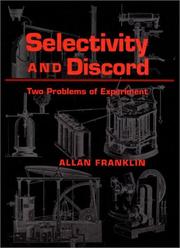
ISBN: 0822961946 9780822941910 9780822961949 0822941910 Year: 2002 Publisher: Pittsburgh : University of Pittsburgh Press,
Abstract | Keywords | Export | Availability | Bookmark
 Loading...
Loading...Choose an application
- Reference Manager
- EndNote
- RefWorks (Direct export to RefWorks)
Selectivity and Discord addresses the fundamental question of whether there are grounds for belief in experimental results. Specifically, Allan Franklin is concerned with two problems in the use of experimental results in science: selectivity of data or analysis procedures and the resolution of discordant results. By means of detailed case studies of episodes from the history of modern physics, Franklin shows how these problems can be--and are--solved in the normal practice of science and, therefore, that experimental results may be legitimately used as a basis for scientific knowledge.
Science - Philosophy --- Physics - Experiments --- Physics - History --- Science --- Physics
Book
ISBN: 3319284118 3319284126 Year: 2016 Publisher: Cham : Springer International Publishing : Imprint: Springer,
Abstract | Keywords | Export | Availability | Bookmark
 Loading...
Loading...Choose an application
- Reference Manager
- EndNote
- RefWorks (Direct export to RefWorks)
This book provides the reader with a detailed and captivating account of the story where, for the first time, physicists ventured into proposing a new force of nature beyond the four known ones - the electromagnetic, weak and strong forces, and gravitation - based entirely on the reanalysis of existing experimental data. Back in 1986, Ephraim Fischbach, Sam Aronson, Carrick Talmadge and their collaborators proposed a modification of Newton’s Law of universal gravitation. Underlying this proposal were three tantalizing pieces of evidence: 1) an energy dependence of the CP (particle-antiparticle and reflection symmetry) parameters, 2) differences between the measurements of G, the universal gravitational constant, in laboratories and in mineshafts, and 3) a reanalysis of the Eötvos experiment, which had previously been used to show that the gravitational mass of an object and its inertia mass were equal to approximately one part in a billion. The reanalysis revealed that, contrary to Galileo’s position, the force of gravity was in fact very slightly different for different substances. The resulting Fifth Force hypothesis included this composition dependence and also added a small distance dependence to the inverse-square gravitational force. Over the next four years numerous experiments were performed to test the hypothesis. By 1990 there was overwhelming evidence that the Fifth Force, as initially proposed, did not exist. This book discusses how the Fifth Force hypothesis came to be proposed and how it went on to become a showcase of discovery, pursuit and justification in modern physics, prior to its demise. In this new and significantly expanded edition, the material from the first edition is complemented by two essays, one containing Fischbach’s personal reminiscences of the proposal, and a second on the ongoing history and impact of the Fifth Force hypothesis from 1990 to the present. <.
Physics - General --- Physics --- Physical Sciences & Mathematics --- Gravitation. --- Science --- Hypothesis. --- Methodology. --- Philosophy. --- Assumption --- Supposition --- Normal science --- Philosophy of science --- Logic --- Reasoning --- Field theory (Physics) --- Matter --- Antigravity --- Centrifugal force --- Relativity (Physics) --- Methodology --- Properties --- History and Philosophical Foundations of Physics. --- Classical and Quantum Gravitation, Relativity Theory. --- Astronomy, Observations and Techniques. --- Measurement Science and Instrumentation. --- Philosophy of Science. --- Physics. --- Observations, Astronomical. --- Astronomy—Observations. --- Physical measurements. --- Measurement . --- Philosophy and science. --- Science and philosophy --- Measuring --- Mensuration --- Mathematics --- Technology --- Metrology --- Physical measurements --- Measurements, Physical --- Mathematical physics --- Measurement --- Astronomical observations --- Observations, Astronomical --- Natural philosophy --- Philosophy, Natural --- Physical sciences --- Dynamics
Multi
ISBN: 9783030625658 9783030625665 9783030625672 9783030625641 Year: 2021 Publisher: Cham Springer International Publishing
Abstract | Keywords | Export | Availability | Bookmark
 Loading...
Loading...Choose an application
- Reference Manager
- EndNote
- RefWorks (Direct export to RefWorks)
There has recently been considerable discussion of a "replication crisis" in some areas of science. In this book, the authors argue that replication is not a necessary criterion for the validation of a scientific experiment. Five episodes from physics and genetics are used to substantiate this thesis: the Meselson-Stahl experiment on DNA replication, the discoveries of the positron and the omega minus hyperon, Mendel's plant experiments, and the discovery of parity nonconservation. Two cases in which once wasn't enough are also discussed, the nondiscovery of parity nonconservation and the search for magnetic monopoles. Reasons why once wasn't enough are also discussed.
| Listing 1 - 10 of 17 | << page >> |
Sort by
|

 Search
Search Feedback
Feedback About UniCat
About UniCat  Help
Help News
News